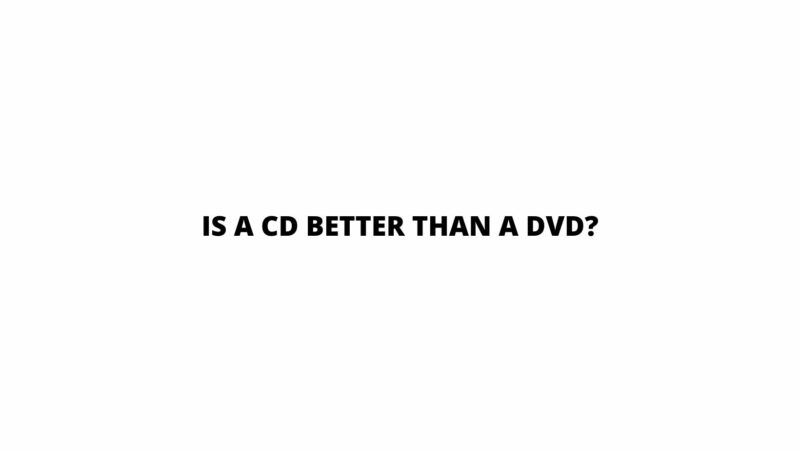In the realm of optical discs, Compact Discs (CDs) and Digital Versatile Discs (DVDs) stand as two iconic formats that have redefined the way we store, share, and experience digital content. The advent of CDs marked a revolution in music distribution, while DVDs transformed video consumption. As technology continues to evolve, the debate over whether a CD is better than a DVD persists. This article undertakes a thorough exploration of the attributes, advantages, and limitations of both formats to shed light on this disc dilemma.
- Disc Basics: CD and DVD Fundamentals
To embark on a meaningful comparison, it’s essential to understand the fundamental differences between CDs and DVDs. A CD employs a red laser to read and store digital data, offering capacities typically up to 700 MB. DVDs, on the other hand, utilize a smaller wavelength blue laser, allowing them to store much more data, often ranging from 4.7 GB (single-layer) to 8.5 GB (dual-layer) or more.
- Storage Capacity: Quantity vs. Quality
One of the most glaring distinctions between CDs and DVDs is their storage capacity. DVDs outshine CDs by a significant margin, making them the preferred choice for multimedia content, including movies, videos, and software. CDs, with their relatively limited storage, excel in storing audio content or smaller data files. The choice between the two depends on the type and quantity of content to be stored.
- Audio Quality: The Music Enigma
CDs hold a special place in the hearts of audiophiles due to their role in revolutionizing music distribution. CDs offer a higher audio quality compared to the older analog formats, such as vinyl records or cassette tapes. The digital encoding used in CDs preserves audio fidelity and reduces the degradation associated with analog formats. DVDs, although capable of storing audio content, are not specifically optimized for high-quality audio reproduction and are primarily used for video content.
- Video Playback: DVD Dominance
When it comes to video playback, DVDs hold the upper hand. With their greater storage capacity, DVDs became the standard medium for movies and TV shows, offering enhanced visual quality compared to older analog formats like VHS tapes. DVDs introduced features such as chapter navigation, language selection, and bonus content that transformed the home entertainment experience.
- Data Storage and Backups
For data storage and backups, DVDs offer a practical solution due to their larger storage capacity. DVDs can store a substantial amount of data, making them suitable for archiving important files, documents, photos, and even small software applications. CDs, while still viable for smaller data storage needs, may fall short when dealing with larger datasets or multimedia files.
- Durability and Longevity
Both CDs and DVDs are susceptible to physical damage over time, including scratches and exposure to environmental factors. However, DVDs’ increased data density can make them more susceptible to data loss due to damage, as a minor scratch can affect more data compared to a CD. In terms of longevity, the use of high-quality discs and proper storage conditions can significantly impact the lifespan of both formats.
- Compatibility and Obsolescence
Compatibility is a critical consideration in the comparison of CDs and DVDs. While both formats have achieved widespread adoption, DVD players are more common in modern households due to their prevalence as a video playback medium. Additionally, as technology continues to evolve, newer formats such as Blu-ray Discs and digital streaming platforms are gradually rendering both CDs and DVDs obsolete for certain use cases.
- Multifunctionality and Convergence
The digital age has witnessed a convergence of functions that were once distinct. DVD players often include CD playback capabilities, blurring the line between the two formats. Similarly, modern devices like computers and laptops can read both CDs and DVDs, making the format choice less critical for general-purpose data sharing and playback.
- The Niche Appeal of CDs
Despite the proliferation of DVDs and the rise of digital media, CDs continue to hold a niche appeal. They remain popular among audiophiles who prioritize audio quality, collectors who appreciate physical media, and musicians who seek to distribute their music independently. The tangible aspect of CDs, with their album artwork and booklet inserts, adds a nostalgic dimension to music consumption.
Conclusion
The question of whether a CD is better than a DVD lacks a definitive answer, as it hinges on the context and intended use. Each format possesses distinct attributes that cater to specific needs. CDs excel in audio quality, nostalgia, and storing smaller data files, while DVDs offer superior storage capacity, making them ideal for video content, data backups, and larger multimedia files. The ongoing evolution of technology and the rise of new formats add further complexity to the decision-making process. Ultimately, the choice between a CD and a DVD should be guided by the nature of the content, storage requirements, compatibility considerations, and individual preferences.


